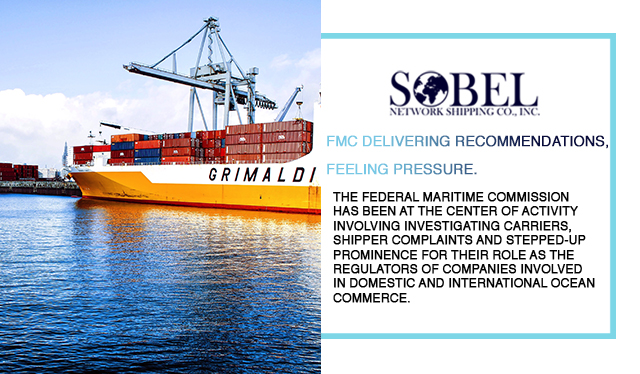The Federal Maritime Commission has been at the center of activity involving investigating carriers, shipper complaints and stepped-up prominence for their role as the regulators of companies involved in domestic and international ocean commerce.
At a hearing on July 28th, two FMC Commissioners presented findings and recommendations on the COVID-impacted ocean shipping environment. That same day, the agency was served with a lawsuit from a shipper seeking $600,000 in damages from the conduct of numerous lines in what they allege are clear violations of the Shipping Act.
Commissioner Carl W. Bentzel provided a summary of his examination of container and chassis manufacturing and the availability of intermodal equipment to support US international containerized trade. His work is expected to be completed next month.
Commissioner Rebecca Dye, the Fact Finding Officer for investigation number 29 into carrier detention and demurrage practices, released an 8-item list of interim recommendations.
Commissioner Dye’s list is published here but there are two notable items that should be called out.
- Amend 46 U.S.C. § 41104(a)(3) to broaden the anti- retaliation provision so that it applies to all regulated entities and protects anyone who complains about potentially unlawful conduct to the Commission.
Unsurprisingly, the concern from shippers and truckers for bringing an enforcement action against a party such as an ocean liner carries the risk of retaliation. In an increasingly smaller pool of carriers, there are fewer choices for shippers to switch their business freely and easily. The recommendation would add additional anti-retaliatory protections for companies who bring an action against regulated parties but have declined to do so out of of reprisal.
- Issue an ANPRM seeking industry views on whether the Commission should require common carriers and marine terminal operators to include certain minimum information on or with demurrage and detention billings and adhere to certain practices regarding the timing of demurrage and detention billings.
Shippers have been bemoaning – and rightly so – the flurry of rate increases and additional charges imposed over the past 18 or so months, including invoices for demurrage and detention which are at best murky and at worst possibly illegal. When Sobel or our truckers receive invoices weeks or months after a shipment has been delivered and are given days to remit, we are caught between billing customers for long-closed files and having to conduct our own research into the veracity of these claims. A change in the law requiring adherence – or consequences for violating the law – would enhance transparency and increase the accuracy and timeliness of these charges.
The $600,000 suite we mentioned earlier was brought by a Pennsylvania-based household furnishings company – claims that a number of carriers refused to negotiate with the company and for the carriers with whom they did have a contract – only provided for a negligible amount of the contracted space – in the case of one named carrier, a paltry 1.6% of the total contracted volume.
None of these actions will bring immediate relief – as much as the shipping public hopes it can and will. With fresh news this week on carrier financial performance – like the jaw-dropping 1,432% profit gain for One Network Express year on year, it can only be a matter of time before the industry which has not a single American-owned carrier in the top ten becomes the target of concerted Congressional action because while few issues of bipartisanship appear to remain in Washington, DC, this is one that both sides of the aisle can rally around.


